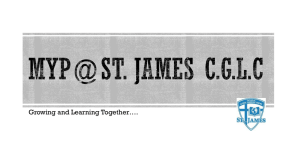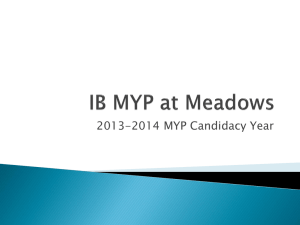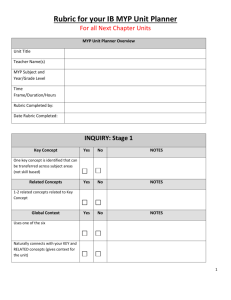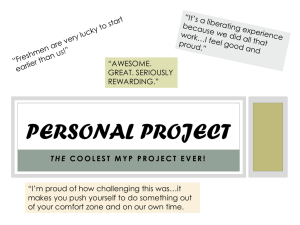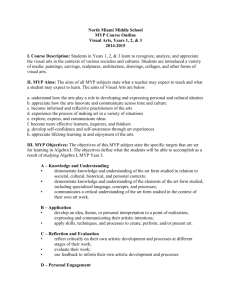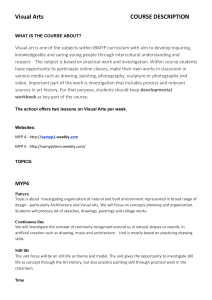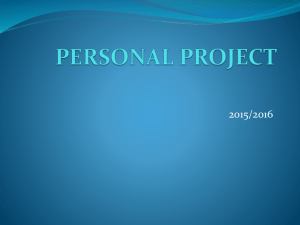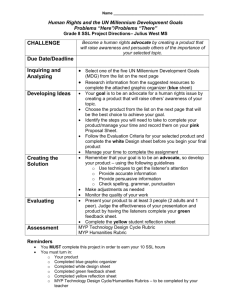Personal Project Intro 2015
advertisement
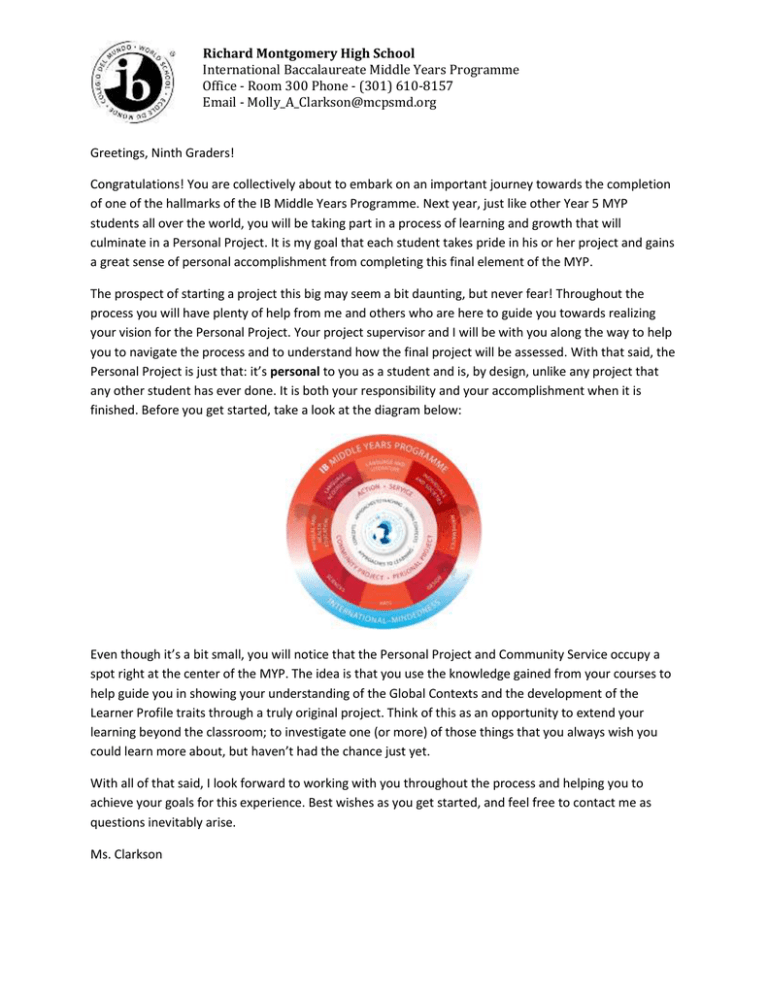
Richard Montgomery High School International Baccalaureate Middle Years Programme Office - Room 300 Phone - (301) 610-8157 Email - Molly_A_Clarkson@mcpsmd.org Greetings, Ninth Graders! Congratulations! You are collectively about to embark on an important journey towards the completion of one of the hallmarks of the IB Middle Years Programme. Next year, just like other Year 5 MYP students all over the world, you will be taking part in a process of learning and growth that will culminate in a Personal Project. It is my goal that each student takes pride in his or her project and gains a great sense of personal accomplishment from completing this final element of the MYP. The prospect of starting a project this big may seem a bit daunting, but never fear! Throughout the process you will have plenty of help from me and others who are here to guide you towards realizing your vision for the Personal Project. Your project supervisor and I will be with you along the way to help you to navigate the process and to understand how the final project will be assessed. With that said, the Personal Project is just that: it’s personal to you as a student and is, by design, unlike any project that any other student has ever done. It is both your responsibility and your accomplishment when it is finished. Before you get started, take a look at the diagram below: Even though it’s a bit small, you will notice that the Personal Project and Community Service occupy a spot right at the center of the MYP. The idea is that you use the knowledge gained from your courses to help guide you in showing your understanding of the Global Contexts and the development of the Learner Profile traits through a truly original project. Think of this as an opportunity to extend your learning beyond the classroom; to investigate one (or more) of those things that you always wish you could learn more about, but haven’t had the chance just yet. With all of that said, I look forward to working with you throughout the process and helping you to achieve your goals for this experience. Best wishes as you get started, and feel free to contact me as questions inevitably arise. Ms. Clarkson What is a Personal Project? Have you ever wanted to build a musical instrument? Do you have a secret passion to write a play? Now is your chance! The personal project is your project to do what you want to do, to show the skills you have developed over the years in your subjects and through Approaches to Learning (ATL), and to apply them to the chosen goal that focus on dimensions of the Global Contexts. Remember, you will be working on this project for an extended period of time, so it needs to be something you really want to do. Whatever type of personal project you decide on, it should: • have a clear and achievable goal • be focused through one Global Context • allow you to express a truly personal understanding of your topic • be the result of your initiative, creativity and ability to organize and plan • reflect your special interests, hobbies, special abilities, or concerns about particular issues • deal with a topic or area to which you are committed • be entirely your own work – authenticity is very important and you will be required to sign a document that the Personal Project is your own work and that all sources of information have been properly cited in your final report. Your project must not: • be part of any assessed course work • take over your whole personal and social life, nor interfere with your studies, even though it will require you to dedicate significant time and effort to complete it. • be too closely linked to any specific subject. Why do a Personal Project? The Personal Project is a culminating event in your time in the MYP. It is a requirement of the program that all students are expected to complete. During your time as an MYP student you will have developed in many ways and learned a great deal. If you choose the right Personal Project, it will give you the opportunity to share with others something that is of great interest to you as an individual but that also shows some of what you have learned as a result of being in the MYP. It’s also excellent preparation for the kind of schoolwork you might encounter in college and for the IB Extended Essay (a requirement of the Diploma Programme). What’s next? When Today Thursday, May 28th By June 5th Summer (OPTIONAL) What Learn about the Personal Project and complete goalsetting exercises Attend the Personal Project exhibition during 8th period and investigate your options. Take notes on other students’ presentations on the notetaking sheet you’ll receive in 8th period. Complete the yellow “Personal Project Plan” organizer prior to writing your proposal. Supervisors will be assigned based on this plan, but it’s okay if it changes. Do some preliminary research and start to record what you’ve learned. Hone in on what you’re really interested in, even if that might be different from your original plan. If you are doing something over summer that you would like to be Personal Project Topic and Goal Development (2015-2016) 2 Late August / early September Mid-September the basis for your project, you should stay in contact with Ms. Clarkson with your questions throughout the summer. Write your proposal and submit it through the school website (completed in social studies classes). Learn about the Process Journal and what it involves. Receive feedback email from MYP Office (to Chromebook email account) Receive Student Handbook and begin the formal Personal Project Process. What type of Personal Project can I do? Depending on your goal, you might choose one of the following types of projects: • an original work of art (for example, visual, dramatic or performance) • a written piece of work on a special topic (for example, literary, social, psychological or anthropological) • a piece of literary fiction (for example, creative writing) • an original science experiment • an invention or specially designed object or system • the presentation of a developed business, management or organizational plan, that is, for an entrepreneurial business or project, a special event, or the development of a new student or community organization. Your project may involve others (for example, if you are directing a play, organizing an exhibition, or starting a new student/community organization). Remember, however, that your own contribution must be central to the event, and clearly visible. It is your work that will be assessed. The most important step you can take to assure a successful project will be to set an appropriate goal. In fact, the majority of your project will be evaluated on the goal you select and how well you accomplish it. The goal should clearly explain what you want to do and why you want to do it. Here are some guidelines for you to follow. One simple test of a good goal is to apply the ABCDs of goal setting. Regarding the Personal Project, here are some questions to ask: Assessable • • How will you be able to measure whether or not you accomplished your goal? Is your goal specific enough to be able to measure? Believable • • Is your project realistic? Can you accomplish your goal in the time you have available? Do you have control over the factors required to make your project work or are you overly dependent on others? Challenging • • Why is the goal worthy of nine months of your time? If it’s not, how could it be extended so that it would provide a greater challenge? Desirable • Is the goal of your project really important to you? Personal Project Topic and Goal Development (2015-2016) 3 • Why is it important? What is the personal connection? Personal Project Topic and Goal Development (2015-2016) 4 An Example Use the ABCDs of goal setting to evaluate the following Personal Project goals. All are related to the topic of tattoos. Which would be the best choice for a Personal Project? 1. to learn about the history of tattoos 2. to investigate what motivates people to get tattoos and how pleased they are with the results 3. to investigate how tattoos affect others’ perceptions 4. to learn about the health risks of tattoos and educate others by creating a brochure 5. to learn about various tattoo styles and design a tattoo for someone What does this tell you about how you should structure your own goal? Think Exercise #1: List 3 topics you are considering for your Personal Project (in order of preference) and explain WHY you are passionate about those topics. 1. 2. 3. Personal Project Topic and Goal Development (2015-2016) 5 Exercise #2: Next, using the ABCDs of goal setting, answer the following questions: Your topic: ___________________________________ Assessable • How will you be able to measure whether or not you accomplished your goal? These measures are called “specifications” and they will be used to assess the success of your project in achieving its stated goal. • Is your goal specific enough to be able to measure? Believable • Is your project’s primary goal realistic? Can you accomplish your goal in the time you have available? • Do you have control over the factors required to make your project work or are you overly dependent on others? Challenging • Why is the goal worthy of nine months of your time? If it’s not, how could it be extended so that it would provide a greater challenge? Personal Project Topic and Goal Development (2015-2016) 6 Desirable • Is the goal of your project really important to you? • Why is it important? What is the personal connection? Having answered all of the questions above, re-write your goal (below) with a few of the specifications for success. Think of these as guidelines for monitoring your success. If it’s helpful, start the sentences with the phrase “I will know my project has been successful if…” Goal Criteria for success Personal Project Topic and Goal Development (2015-2016) 7 The Global Contexts – Focusing your Personal Project Remembering way back to middle school, you probably heard a lot about the Areas of Interaction as a component of the MYP. Since then, the Areas of Interaction have changed a bit, in the interest of making them clearer and easier to understand. Now, they are called the MYP Global Contexts, and there are six of them. You can think about these Global Contexts as “lenses” for your project; a way of giving the project focus and clarity of purpose. Use the guiding questions and descriptions below to help you choose an appropriate Global Context for your project. You should only choose one. Identities and Relationships Who am I? Who are we? Students will explore identity; beliefs and values; personal, physical, mental, social and spiritual health; human relationships including families, friends, communities and cultures; what it means to be human. Orientation in Space and Time What is the meaning of “where” and “when”? Students will explore personal histories; homes and journeys; turning points in humankind; discoveries; explorations and migrations of humankind; the relationships between, and the interconnectedness of, individuals and civilizations, from personal, local and global perspectives. Personal and Cultural Expression What is the nature and purpose of creative expression? Students will explore the ways in which we discover and express ideas, feelings, nature, culture, beliefs and values; the ways in which we reflect on, extend and enjoy our creativity; our appreciation of the aesthetic. Global Context Identity and relationships Orientation in space and time Personal and cultural expression Example topic – Rap as a music genre Examine the question, “Why does rap speak to me?” Explore the development of rap as a style of music across continents Perform a rap song that expresses your unique culture for peers and have a question-and-answer session Scientific and Technological Innovation How do we understand the world in which we live? Students will explore the natural world and its laws; the interaction between people and the natural world; how humans use their understanding of scientific principles; the impact of scientific and technological advances on communities and environments; the impact of environments on human activity; how humans adapt environments to their needs. Globalization and Sustainability How is everything connected? Students will explore the interconnectedness of human-made systems and communities; the relationship between local and global processes; how local experiences mediate the global; the opportunities and tensions provided by world interconnectedness; the impact of decisionmaking on humankind and the environment. Personal Project Topic and Goal Development (2015-2016) 8 Fairness and Development What are the consequences of our common humanity? Students will explore rights and responsibilities; the relationship between communities; sharing finite resources with other people and with other living things; access to equal opportunities; peace and conflict resolution. Global Context Scientific and technical innovation Globalization and sustainability Fairness and development Example topic – Solar energy devices Design a 3D model of a solar device with instructions for construction Investigate how, in history, different cultures have made use of energy for different needs. Examine the possibilities presented by solar energy technology to solve problems of limited resources. The following table shows some examples of the use of each global context for an MYP personal project. Global Context - Identities and relationships • Two sides of social networking; an awareness campaign about digital citizenship and cyber bullying • How online identities impact offline relationships; a research essay • Keeping culinary traditions; cookbook following family recipes with historical relevance Global Context – Orientation in space and time • Explorers in search of a new world; immigration over the ages through visual texts • The Mayflower and the dream of religious freedom; a personal family history • Charting a family history through archives and visually representing genealogy • Representing local history; a running map of local historical sites Global Context – Personal and cultural expression • Video games as a form of cultural expression; a short film using five video games that shows how they are an expression of our culture • The art of Manga in Japanese culture; a Japanese anime and a survey of the understanding of peers • Culture and self-expression through dance at the local community arts center; a performance Global Context – Scientific and technical innovation • Vintage video games and handheld controllers; building a device • Why are genetics and genomics important to my health?; a media presentation • Can stem cells replace organ transplants?; an investigative report Global Context – Globalization and sustainability • The struggle for water in developing countries; an awareness campaign • The impact of the financial crises of Europe and the European Economic Community on the United States; a visual presentation • Education as the tool to change the future of Peru; a workshop for adults • The role of the developing countries in protecting the tropical rain forest; a collection of slides Global Context – Fairness and development • Supporting fair trade: Cocoa trade in Ghana; an awareness campaign for our school restaurant/cafeteria to promote fair trade • Open-market economies and their role in fair trade; a talk for students • Exploring the intersections of race and inequality; a radio broadcast Personal Project Topic and Goal Development (2015-2016) 9 All projects will, by their design, show some understanding of the MYP Approaches to Learning as well. These skills should be represented in your process journal, which you will begin after your project has been submitted. Throughout the Personal Project process, you should keep track of how you are using and developing skills in the following Communication – Interaction with others and literacy skills Research - Information and media literacy, critical literacy Self-management – Organization of time and materials and affective skills Social Skills – Collaboration with others Thinking - Critical thinking, creativity and innovation, reflection and transfer of skills and ideas from one type of task to another. Personal Project Topic and Goal Development (2015-2016) 10 The IB Learner Profile and the Personal Project Since you began in the IB Middle Years Programme, you have participated in a variety of classroom, school-wide and extra-curricular activities designed to help you develop the characteristics of an IB Learner. The Personal Project is an opportunity for you to show us how well you can demonstrate these qualities. Please think about this as you begin your Personal Project. Inquirers – You are expected to select a topic about which you are curious and have questions. If you think you already know everything you need to know in order to complete your project, then you do not have a good idea. It may be helpful to list questions you have early on to be sure you are on the right track Knowledgeable – You are expected to know where to find information to answer the questions you may have about your topic and or your product. Remember, this is a research project and needs to include primary and/or secondary sources Thinkers - You are expected to use the knowledge you gain from your research to successfully complete your project Communicators – You will need to determine the best way to communicate what you have learned and justify your choice. (e.g., scrap book, video, brochure, power point, piece of art, music, creation, event etc) Caring – You may want to think about how your project can benefit other people and/or how it may benefit the environment Open-minded – You may want to think about how your project can present an opportunity for you or for others to learn more about your own or other cultures Risk-takers – You may want to think about how your project can present an opportunity for you to stretch yourself and try something new or unfamiliar. Principled – Remember that your project will provide an opportunity for you to take responsibility for your own actions as you work to achieve your goal, as well as any consequences for the decisions you make Balanced – Your project will definitely help you to see how well you can manage your time to be sure you meet deadlines, while also taking care of other academic responsibilities, out of school commitments and the need for “down time” Reflective – Throughout your project, you will be expected to reflect on your progress, the need to make any changes, and your personal strengths and challenges. Before proposing your project, consider your strengths and areas for growth as they relate to the Learner Profile traits above. Think about the implications that your strengths have for what kind of project you can (and should) do before you sit down to write your proposal. Personal Project Topic and Goal Development (2015-2016) 11 Project Timeline Each student’s exact project timeline will be slightly different, however, this chart provides a general idea of what all students should be working on over the next few months. If you get ahead or behind in the project, do not get discouraged or stop working. Continue working on the project and seek help from your project supervisor, who will be assigned next school year. Use the blank space at the bottom to set your own goals for completing the project. May June Brainstorm topics of interest and select a potential topic. Personal Project Plan sheet due June 5th. July Personal Project Management: What to do and when August September October November December January Submit a proposal and receive feedback on your plan. Conduct background research on your topic to help you narrow your topic towards a proposal. OPTIONAL: Students who would like to begin work on their project over summer should contact Ms. Clarkson regarding their ideas and plans. Do ongoing research to help you achieve your goal. Record your sources of information using your chosen citation platform. This research should be more specific and directed than your background research. Establish and use a process journal to record your thoughts, research findings and ideas about the project. This journal can be a traditional notebook or digital one, such as an ongoing Word document or a LiveBinder. Meet regularly with your project supervisor. Meetings are generally held during an extended lunch period in the second week of each month. Complete Personal Project Checkpoints (included in the Student Handbook). Work towards completing your final product or outcome by the time you return from winter break. This will leave you time to complete the report. Production of the project report and choosing the process journal extracts. Final product or outcome due Fri, Jan 29th Personal Project Topic and Goal Development (2015-2016) 12
